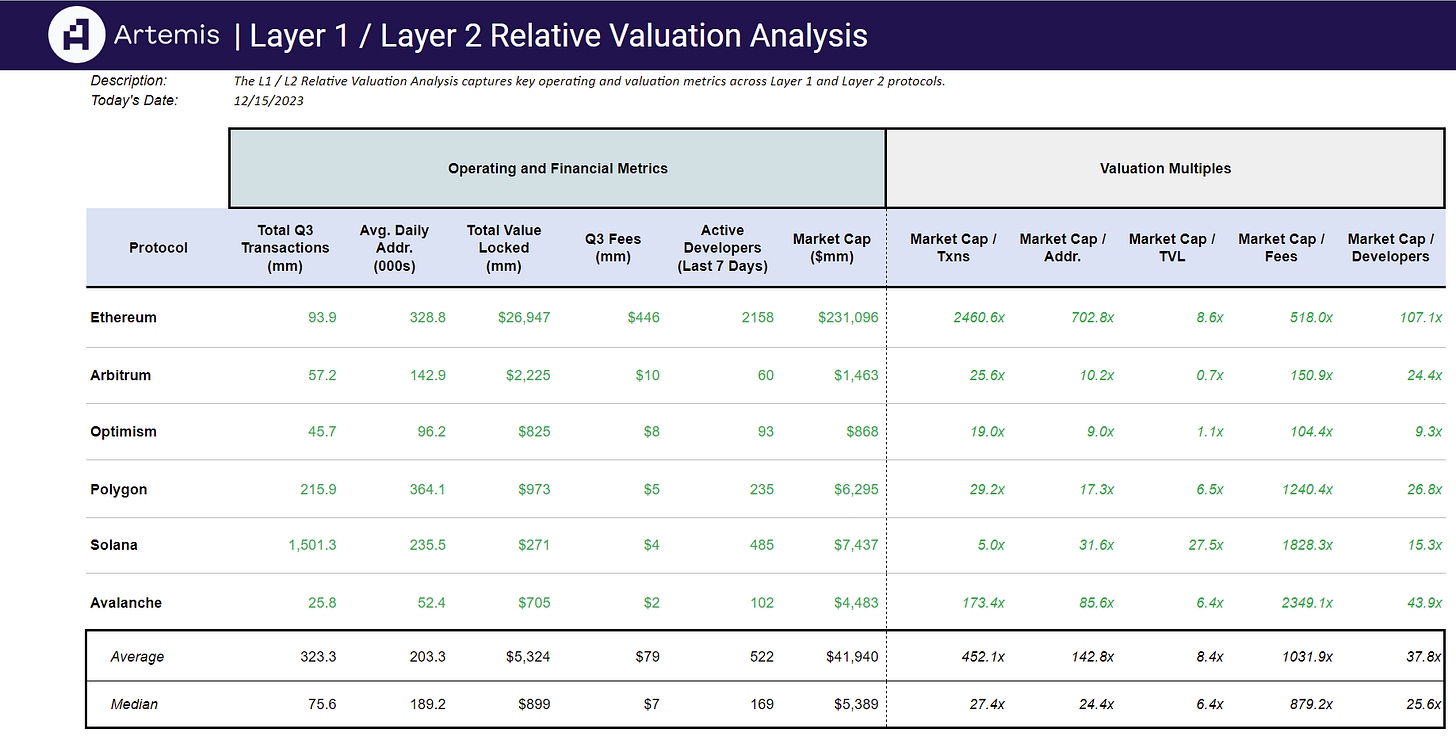This week, Bitcoin crosses Silver to become the second largest commodity ETF, Donald Trump states that he would never allow CBDCs if elected and Blackrock crosses $1bn in AUM for its Bitcoin ETF.
🌞 Coinbase fights the SEC in court over the definition of securities
💫 FOX Corp plans to authenticate digital media using blockchain technology
The week saw continued declines across major tokens as average and median W/W prices fell by 6.3% and 6.5%, respectively. While majors BTC and ETH saw low single digit declines, layer 2s and alt l1s including OP and NEAR saw double digit declines of 18.8% and 13.7%, respectively, as the crypto market unwound after excitement from the BTC ETF offering settled in. SOL and BNB were the only alt L1 tokens to end the week up at 3.2% and 5.8%, respectively. The S&P 500 and Nasdaq Index grew by 1.2% and 2% WoW, respectively, with the S&P rallying to all time highs supported by continued gains in the tech sector.
🌞 Coinbase fights the SEC in court over the definition of securities
This Wednesday, a federal judge in Manhattan listened to the Coinbase and the SEC debate their divergent views on whether digital assets are securities, and on whether the largest US crypto exchange is running a legitimate business. Coinbase is pushing to dismiss the case that the SEC brought upon them based on the opinion that SEC is misinterpreting existing US securities laws and overstepping its bounds. The day ended with no formal decision being made by Judge Katherine Polka Failla, who noted that she continues to weigh some critical questions following the day-long session.
What is at stake for Coinbase?
If Coinbase loses the case, the SEC could compel Coinbase to remove tokens from its platform that it deems to be securities, and continue the SEC’s pursuit of crypto platforms as unregistered exchanges offering unregistered securities. At this time, 13 tokens were named in the complaint, but Gary Gensler has previously stated on multiple occasions that most cryptocurrencies represent securities.
If the SEC loses the case, the multiple losses the agency has suffered over the past few months will continue to add up and strengthen the crypto industry’s perspective that the regulator is overreaching.
What are the primary points of contention?
The SEC represents that the purchase of crypto tokens support a “larger enterprise" and that the offering of crypto tokens making them similar to that of an investment contract. If the purchase of tokens represents an investment contract, it would meet the requirements of the “Howey test,” a set of conditions used to define a security taken from the SEC vs. Howey case of 1946. Some the agency’s arguments are as follows:
Tokens are securities because they’re associated with developers and an ecosystem. Purchases of tokens are investments in what could be construed as “a common enterprise” for profit (a component of the Howey Test)
The agency notes that when the value of an ecosystem increases, the value of the associated tokens would also increase, which would indicate that the purchase of token would be an investment of money, with the expectation of profit, to be derived from the efforts of others (the other three components of the Howey Test)
With that said, both the SEC and Coinbase actually agreed upon the fact that tokens themselves aren’t securities - however, the SEC lawyers argued that each trade where an investor purchased a token meant that the purchaser was entering into an investment contract, and thus that Coinbase had broken securities law. On the other side, Coinbase intuits that they simply run a secondary market where there is no contract in place, and there cannot be securities.
Ultimately, while the case remains unresolved for the time, Judge Failla did make comments that indicated existing laws used to govern securities may be outdated and may require updating in the context of new technologies.
💫 FOX Corp plans to authenticate digital media using blockchain technology
FOX Corporation announced the launch of the “Verify” platform, an open source protocol developed on the Polygon blockchain network.
The intention of the platform is to “establish the authenticity and origin of digital content” in anticipation of the proliferation of AI-generated audiovisual content trained on media company data. The Verify platform was seeded out of FOX’s Blockchain Creative Labs, and plans to make licensing more straightforward for the training of generative AI tools trained on LLMs such as ChatGPT.
Tubi (which manages FOX’s Blockchain Creative Labs) CEO Paul Cheesbrough stated that Verify could also assist in reducing licensing issues between news outlets and AI developers who train models utilizing media content. The issue of utilizing training data for large language models was a key point of contention in the New York Times lawsuit against OpenAI regarding copyright infringement where the Times alleged that millions of its articles were used to train the ChatGPT model without compensation.
How does Verify Work?
Verify will serve as a distributed internet database of media content that is cryptographically signed to verify the origin and history of a specific piece of content. Media companies will be able to register their content to the platform in order to verify that it belongs to them. Once the content is verified, companies will be able to grant rights to AI platforms such as OpenAI that want to use their content to train new LLM models. Verify has already built integrations with third-party publishing systems to allow media companies to automatically assign their content to the Verify protocol when they publish it from their content management systems. Media companies and creators will also be able to utilize a tool to cite specific pieces of content to confirm whether or not it’s been verified on the Verify network.
Verify has already launched its Beta version last August has already assigned over 80,000 pieces of content from FOX’s news brands such as Fox News, Fox Business and Fox sports. While it is still early in the company’s journey and it remains to be seen whether this technology is adopted on a broader scale, it’s clear that innovative solutions are required to resolve copyright issues relating to AI-generated content.
Detailed dashboard for people who love more numbers in smaller font:
Note: Revenue represents fees that go to the protocol’s treasury or are returned to tokenholders via a burn mechanism (source: Token Terminal). Weekly commits and weekly dev activity as of 1/6/23.
The content is for informational purposes. None of the content is meant to be investment advice. Use your own discretion and independent decision regarding investments.
Artemis Sheets
Check out other analyses such as the Artemis Relative Valuation L1 / L2 Analysis in Google Sheets here! Track valuation multiples across key operating metrics for top blockchain including Ethereum, Arbitrum, Optimism and Solana.
Powered by Artemis Sheets 🌞








